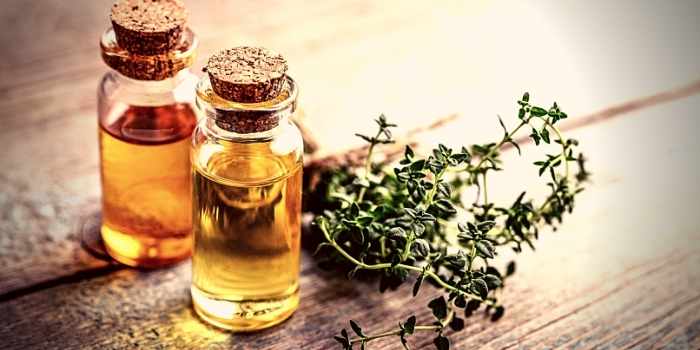
Many people struggle with different health conditions, leading to a need for specific oils that can provide relief.
But the problem is that each type of oil has its own set of benefits, making it difficult to choose the right one for a person’s needs.
Even centuries, people believed thyme spiritual properties of the thyme would help their illness.
You don’t have to worry about it affecting other conditions with thyme oil. It is a versatile essential oil that relieves pain, inflammation, and other health problems!
Thyme and Thyme Oil

Thyme is a diverse herb that comes in many varieties. It can be identified by its thymol, which is the chemical compound that gives its distinct aroma and flavor.
Thyme oil has a yellow to reddish-brown color, ranging from clear to opaque. The variations in color depending on the variety of thyme used and the method it was extracted.
As early as the 11th century, thyme spread to Central Europe from the eastern Mediterranean area, where it had been for a long time before that.
Today, thyme is grown mainly in Central and Southern Europe, the Balkans, East Africa, and Morocco.
It has been used for a long time, but why is it still so popular today?
Because thyme oils have a lot of benefits
Thyme Oil Uses
Numerous studies have shown that thyme essential oils can reduce or eliminate foodborne diseases, improve heart health, and relieve inflammation.
It’s important that you understand that there is no evidence that thyme oil can cure any particular disease.
Although more research is required, it is believed that thyme oil can be used in combination with other therapeutic programs and not as a single treatment.
Many compounds in thyme oil have health advantages. These compounds include:
- Carvacrol
- Thymol
- Linalool
- Cineol
- Camphor
- Borneol
Let’s now look at the benefits of these compounds for various uses of thyme oils.
What is Sweet Thyme Essential Oil?
Sweet thyme essential oil has fresh, earthy, and herbal notes. It is used for flavoring bread, pastries, sugar cookies, and even desserts. It is also a great addition to your home cleaning routine!
Sweet thyme essential oil can help relaxation and body cleansing while supporting healthy sleep patterns.
Myth and truth:
This is still the case today. People like to use thyme as a medicine, even if you get a terrible cold in the fall or winter.
The Greeks used thyme oil to acquire bravery and vigor. The plant’s name originates from the Greek word “thymos,” which means “courage. Spiritual properties of the thyme to increase courage.
First reported as a treatment for respiratory disorders and inflammation by Hildegard von Bingen in the 12th century. Since then, the herb has helped with coughs, sore throats, and hoarseness.
The antibacterial properties of essential thyme oil prevent the formation of germs.
There are two active oils in thyme that have been found to have an anti-inflammatory effect, thymol, and carvacrol.
Spiritual Uses For Thyme
You can use herbs for spiritual purposes because they have a calming and meditative effect on our brains. Most people use thyme in that regard.
When you get calm, you can get more benefits from meditation.
Thyme’s digestive

Good digestive important for health as well as mood and brain!
Thyme is an excellent spice for those who have trouble digesting fatty foods. This herb has been used in cooking for centuries, and it aids the digestion process.
This can help those with liver problems. It also helps with gas and bloating. Thyme is versatile and preserves its flavor when cooked. For daily or heavy usage, a thyme extract is typically preferable.
Understandable given thyme’s reputation as a natural antibacterial.
Thyme – antifungal and anti-periodontal
Finally, thyme’s fungicidal and antibacterial qualities are worthwhile for oral infections and inflammation.
Studies demonstrate that its essential oils can stop the growth of the well-known yeast fungus ” Candida Albicans. “
Also, thyme’s therapeutic properties can help prevent tooth decay, gingivitis, and periodontitis. The essential thyme oil kills oral bacterial infections.
So brush your teeth often and rinse with a thyme solution.
Despite this, thyme isn’t only a “medicinal herb.” It is also used in cooking.
You may quickly grow thyme in your yard, balcony, or even on a sunny window sill as a potted plant.
The thyme plant is known for its medicinal properties. It has been used as a natural remedy for a long time. The plant has been effective in treating oral infections, inflammation, and sinusitis.
It is extremely effective against fungi.It is strong in antibacterial and antifungal properties. It can be used in many natural products such as mouthwashes, deodorants, and insect repellents.It has been proven effective against the fungus responsible for oral thrush.
Thyme – A Cancer Cure?
Studies suggest that Thymus mastichina L. can help prevent colon cancer. The components of thyme have been shown to cause cell and tissue damage in cancer cells.
Researchers from Celal Bayar University in Turkey found similar results. They tested wild thyme (Thymus serpyllum) for its anti-cancer properties. In studies, it killed cancer cells.
Finally, thyme might assist create novel treatments for breast cancer.
Thyme – A herb for “common ailments.”
Aside from cancer, prevalent illnesses are increasingly in the spotlight. High blood pressure and diabetes are two examples. But thyme has grown up against it.
According to Serbian research, an extract from wild thyme was able to reduce blood pressure in rats. The study team is pleased “that thyme can also protect against hypertension in individuals.”
The antioxidant qualities of thymol and carvacrol help treat diabetes. They help prevent oxidative stress (lipid peroxidation) that causes diabetes.
Thyme, along with other herbs, has reduced blood glucose levels in people with diabetes. Subjects used thyme as a spice in their meals.
Thyme is one of the herbs with the highest ORAC value due to its antioxidant qualities.
Thymol is high in antioxidant levels. Thymol and carvacrol have antioxidant properties that help with diabetes.
Other uses of thyme oil
Due to its valuable ingredients, thyme oil is not only used for common colds, for example, in a cold bath. Still, it can also be used for bronchitis and whooping cough. In addition, it can relieve spasmodic coughing fits in asthma.
Other areas of application of thyme oil are:
- inflammation of the gums
- tonsillitis
- digestive problems
- foot odor
- Strengthening of the immune system
In aromatherapy, thyme oil is used for numerous other ailments, such as:
- hair loss
- fungal infections
- joint and muscle pain
- cramps
- circulatory problems
So far, however, none of the effects of the oil in aromatherapy has been proven by a scientific study.
Generally, it should be noted that thyme oil should never be applied directly to the skin, as it can cause skin irritation. Always mix thyme oil with a carrier oil. Pregnant women, people with a pollen allergy, and children under the age of two are generally advised not to use the oil.
Thyme oil side effect
You may be allergic to mint oil or thyme oil. It’s depend on person to person.
Some of the bad reactions to thyme oil might be:
- Dizziness
- Conjunctivitis
- Asthma
- Muscle weakness
- Distress and gastrointestinal irritation
Thyme oil should not be taken in large quantities or applied undiluted to the skin.
If you want to use thyme oil in your face, please content your doctor.
Summary
Many people struggle with different health conditions, leading to a need for specific oils that can provide relief.
Thyme is a versatile essential oil that relieves pain, inflammation, and muscle aches and cramps.
Thymol can lower the number of infections and the risk of resistance development.
For daily or heavy usage, a thyme extract is typically preferable. Fresh thyme Thymus mastichina L. can help prevent colon cancer. The essential thyme oil kills oral bacterial infections. Thyme is one of the herbs with the highest antioxidant potential. It should be noted that thyme oil should never be applied directly to the skin.
Is Thyme Good for Hair?
You can DIY treat dry and brittle hair with thyme. This will give your hair enough moisture to make it shiny again. This thyme hair care is economical and helps to save resources.
Is thyme good for the lungs?
SURE. Thyme encourages mucus production and relaxes the bronchial tubes, which become spasmodic from frequent coughing. It also has an antibacterial effect. Primrose root not only has a mucus-dissolving action but also helps with pain.
Does thyme promote sleep?
Thyme helps you be more relaxed and even has anxiety relief benefits! People who regularly use thyme help you get a more relaxed state. Also, its anti-inflammatory property.
Is Thyme Good for Your Stomach?
Thyme can also be used to treat stomach problems and stimulate appetite. It is a crucial ingredient in Mediterranean cuisine and aids with the digestion of high-fat foods.

